Why do companies buy back shares?

Investing your money helps it grow for your future wealth and financial independence. In general, it’s best to hold onto your assets for as long as possible to see the best returns, share buybacks are a perfect example of how this works.
What is a share buyback?
A share buyback, also known as stock buyback, is when a company buys back a set amount of its own shares from shareholders.
This is a strategy companies use to increase their stock value, making it a win-win for all involved as you are usually offered a good price in the shares you sell and see an increase in value on the ones you hold onto.
Why do companies buy back their own shares?
There are a number of strategies where buybacks are used that are beneficial to both company and shareholders. In many cases, it’s a sign that a company has performed well and has an increase in profits. Occasionally stock buybacks can have more sinister intentions - aiming to deceive shareholders. Keeping an eye on company performance can help assess if your share buyback offer is genuine or not.
What are the different types of share buyback?
There are two different types of share buybacks, on-market and off-market.
On-market buybacks
On-market buybacks are when shares are purchased in the same manner as everyday trading on the stock exchange, making the offer open to anybody.
Off-market buybacks
Off-market buybacks are when a company will contact shareholders and make a private offer to purchase stocks. These can be all-inclusive, an open offer to everyone who has shares, or selective, where only one group is invited - however, all shareholders must agree to a selective buyback first.
What are the benefits of a share buyback?
There are a number of legitimate reasons behind a share buyback that have significant benefits as well as being a rewards system that encourages and strengthens shareholder loyalty.
Directly boost share prices
In most cases, the shares will be repurposed, not held by the company, so they are no longer part of the share configuration, meaning available shares are less and therefore more valuable.
Tax efficiency
Dividends are shareholders' main way of gaining income from their investment, however, it is a taxable income. After a buyback, share value usually increases, providing better tax efficiency as rising share values aren’t taxed.
More flexibility than dividends
It’s difficult and risky for a company to change dividends or introduce new ones as they will need to commit to that set-up for the long run. Share buybacks are a fast, one-off event giving companies the ability to set and manage the costs and rules over a shorter time frame.
Offset dilution
A company may find they have allocated too many shares over time, diluting the value to shareholders. This is especially the case when shares are used as part of recruitment incentives. Over time this will need to be amended with a buyback to reduce share numbers and increase value.
What stock buybacks mean for you
When a company is thriving and looking after its continued business success then a share buyback can help them to distribute extra cash and increase share value. As a shareholder, you are more likely to reap the benefits of better investor value and long-term profitability.
When a share buyback is issued you need to carefully analyse and research the company and stock value to know what the right move is for your investment. Begin your stock market education and journey to financial freedom. Remember, you are not obliged to sell any of your shares and can stand to gain a lot for the ones you hold onto.







